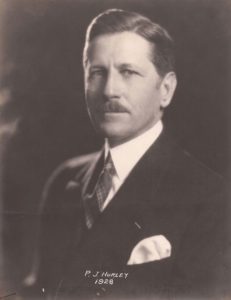The Nominating Committee unanimously nominated Patrick J. Hurley for Commander on June 23, 1927. He had just completed successful management of Herbert Hoover’s Presidential campaign in Oklahoma and was an obvious choice for Commander.
Up to this point in his life, Hurley had many civic and military accomplishments from humble beginnings. He was born to Irish immigrants who settled in Indian Territory near Lehigh, in the Choctaw Nation. His father worked as a coal miner, while also farming a small plot of land. Patrick worked in the mines from age 11. His mother died when he was 13, and his father was disabled from a mining accident and unable to work. Patrick was the sole source of support for his father and sister.
In 1898, at the age of 15, after a failed attempt to join the Roughriders, Patrick drifted to Cherokee County, Oklahoma where he worked as a cowboy, befriending Will Rogers, and they became lifelong friends. After saving up enough money, he attended what is now Bacone College. After graduation, he worked as a clerk in the Indian Service, and then earned a law degree at National University in Washington, D.C. He then returned to Tulsa and practiced law, serving as the first President of the Tulsa County Bar Association. In 1911 he was appointed Choctaw Nation National Attorney, holding the post until 1917 (winning many cases establishing tribal rights). In 1916, as a member of the Oklahoma National Guard, he was mobilized to serve in Pershing’s punitive campaign against Pancho Villa. In World War I he served in the Army Judge Advocate General’s Office, then deployed to Europe with the First Army Artillery as an inspector general. After the Armistice, now Lieutenant Colonel Hurley was ordered by General Pershing to remain in Europe and serve as principal negotiator of the treaty with the neutral Duchy of Luxembourg allowing transit of the American Expeditionary Force for the duration of the occupation of Germany. For this accomplishment he was awarded the Army Distinguished Service Medal. After the war, Hurley returned to Tulsa, invested in real estate, was a banker and practiced law in Tulsa. He was active in politics, though he did not run for office, with the Hoover campaign being his most important political activity to this point in his life.
His later accomplishments, as Secretary of War, Ambassador to China, and in a variety of other posts are well-chronicled in two biographies and various web sites. He was inducted into the Oklahoma Hall of Fame in 1938, and posthumously inducted into the Tulsa Hall of Fame in 2001.
Biographies:
Russel D. Buhite. Patrick J. Hurley and American Foreign Policy. Ithaca, NY: Cornell University Press, 1973.
Thomas L. Hedglen, “Hurley, Patrick Jay,” The Encyclopedia of Oklahoma History and Culture, www.okhistory.org (accessed March 14, 2017).
Don Lohbeck. Patrick J. Hurley (Chicago: Henry Regnery Co., 1956).
Writings of Patrick J. Hurley
Patrick J. Hurley. Choctaw Citizenship Litigation. Choctaw Nation: 1916 (eBook). https://archive.org/details/choctawcitizensh00choc. (accessed March 14, 2017).

